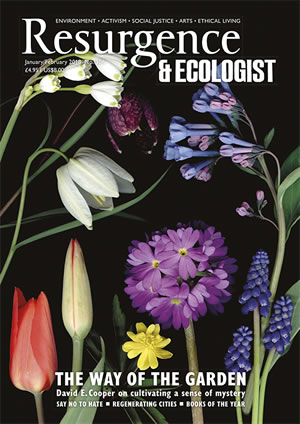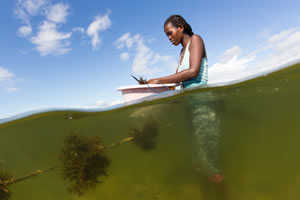Irene, a resident of Tampolove village, in a remote and arid part of Madagascar, was still at school when she had her son. With little to no access to health care, she would have had to walk 30 miles to the nearest clinic to access a modern method of contraception. Women like her were having on average seven children, and faced a 1 in 20 risk of dying in pregnancy or childbirth – many thousands of times higher than in the UK. The population of the region was doubling every 10 to 15 years, placing increasing pressure on fisheries, and couples were struggling to catch enough fish to feed their families.
So women sought help from an organisation working in the area: Blue Ventures, a marine conservation social enterprise that works in many remote communities that often rely almost entirely on fishing for their livelihoods. “Women were telling us how they desperately wanted better access to family planning services, and because we were already partnering with these communities on livelihoods and natural resource management initiatives they turned to us for help,” said Vik Mohan, medical director at Blue Ventures. “So we took what felt, at the time, like a bold and unconventional move [for a conservation organisation], and we opened our own family planning services in the community.”
Since then, Blue Ventures has trained local women like Irene to work as community health workers, and has partnered with Marie Stopes Madagascar, which offers long-acting methods of contraception and provides more complex care. A partnership between the conservation and health sectors, integrating sustainable livelihood and family planning actions, has provided opportunities to engage women in natural resource management, and men have become more supportive and involved in reproductive health.
Vik told Irene’s story at an event organised by the Margaret Pyke Trust as part of the Family Planning Summit held in London. The event, titled ‘A Win-win for Human and Environmental Health: How Conservation Programmes Can Be Strengthened By Meeting Family Planning Needs’, focused on a critical and yet often overlooked issue.
The global human population is increasing – in Africa, it is projected to quadruple from around 1 billion today to around 4 billion in 2100 – with the overwhelming majority of growth taking place in regions facing particularly complex development challenges, including poverty and inequality, environmental degradation, ill health, and a range of other related social problems. The ability of any nation to respond to these problems is further exacerbated when there are a significantly greater number of people whose health, education and social needs must be met.
While rural areas are, almost invariably, of greatest conservation significance, they are also the areas that, generally speaking, have higher rates of population growth. This is in part due to the greater barriers to family planning information, rights and services. People living in remote rural areas are also more likely to rely most directly on their local environment and natural resources for their food, water, livelihoods, medicines and building materials. When population growth impacts on the health of the ecosystem, it therefore also affects the health of rural communities. Reproductive health and rights are critical, not only for the health and empowerment of girls and women, but also more broadly.
Despite this demographic reality, many conservationists have been reluctant to consider population and family planning when developing conservation policy and programme design, but there are positive signs this could be changing.
There is an approach used in the development sector known as Population, Health and Environment (PHE), which recognises this connection. The model addresses the complex connections between families, their health and their environment by combining sustainable livelihood generation with family planning work. PHE is particularly appropriate for people living outside the reach of health-care systems, in sensitive rural areas.
Speaking at the event on the sidelines of the Family Planning Summit, Kristen Patterson of the Population Reference Bureau said: “The PHE approach is one proven method of holistic development [bringing together] conservation and reproductive health actions simultaneously.” She shared her own personal experiences of living in Niger, where she saw first-hand the connections between population, health and environment, and how that changed her perspective on the world.
A review of 10 years of PHE implementation carried out by the United States Agency for International Development sheds light on key benefits of PHE programming, including that communities are often quicker to feel invested and get involved, and that short-term results tend to lead to longer-term sustainable impact. By responding to people’s most pressing needs, PHE projects foster greater local trust and help build local ownership.
One example can be found in Groot Marico, in the North West Province of South Africa. The project, named by the locals A Re Itireleng, which means ‘Let’s do it ourselves’ in the Setswana language, is run by Margaret Pyke Trust, Pathfinder International and the Endangered Wildlife Trust. It was designed to meet the need for sustainable livelihoods in the context of climate change and insufficient access to family planning.
In the heart of the project area are the headwaters of the Marico River, a watercourse of regional importance. A healthy Marico River is critical for the survival of endemic and vulnerable species, and to sustain the livelihoods of the largely agricultural community. Downstream many other communities rely on the Marico River, as do the ecosystems through which its waters flow, such as Kruger National Park.
The area and its inhabitants are increasingly threatened by droughts and the demands being made on water supplies by a growing human population. The Endangered Wildlife Trust had been working in the area for some time, providing training on sustainable livelihoods to enable conservation-focused agriculture practices including water harvesting and permaculture principles, when local people identified the need for greater access to family planning services, and the programme evolved into a PHE project. By themselves, neither environmental livelihood actions nor family planning actions could adequately respond to the interrelated challenges. The community and ecosystem need PHE.
There are hundreds of millions of people like Irene living in sensitive and remote rural areas where human health and wellbeing are closely associated with ecosystem health, where access to healthcare is limited, and where communities rely on the local environment for their food and water security. Many of these areas, such as the coastal communities where Blue Ventures works, and the Groot Marico community, are also particularly vulnerable to the impacts of climate change. Population growth, which is in part due to barriers to family planning information and services, exacerbates all these challenges.
But change is possible. Today, Irene makes a comfortable living growing seaweed and sea cucumbers through an initiative supported by Blue Ventures, and is a passionate advocate of family planning in her village.
Programmes like these have changed people’s lives for the better. So why aren’t more environmental organisations and funders responding to these development concerns with integrated approaches? The reality is that most development aid is funded in silos, and most conservation and health organisations lack the cross-sectoral expertise necessary to work simultaneously in these sectors.
For too long, conservation and human development agendas have been distinct from and even in competition with one another, failing to address the critical relationships between people, their health and wellbeing and the environment. The 2030 Agenda for Sustainable Development, set by the United Nations in 2015, and its 17 Sustainable Development Goals were hailed as integrated and transformative. PHE programmes are one way to make sure that integration happens and we achieve those goals. It is an approach that we hope and believe will become substantially more common in the coming years. That can only be good news for both human and environmental health.
BLUE VENTURES is a member of the Population & Sustainability Network, a global alliance that promotes reproductive health and rights as a critical element of sustainable development. The Network was launched as a Partnership for Sustainable Development under the UN Commission for Sustainable Development in 2004. With other environmentally focused members, including the Endangered Wildlife Trust and Friends of the Earth, development bodies such as the UK Department for International Development, and reproductive health organisations like the International Planned Parenthood Federation, it is a further example of the coming together of health and conservation groups. The Network is administered and coordinated by the Margaret Pyke Trust, which is, uniquely, both a member of the International Union for the Conservation of Nature, and a charity with 50 years’ family planning expertise.








